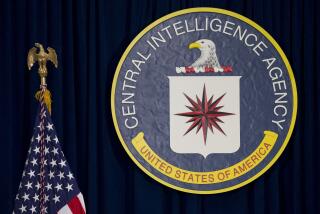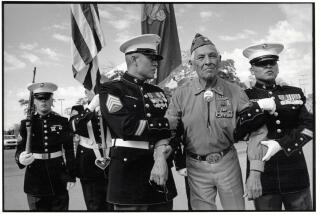Documents reveal Pentagon gave Hollywood special Bin Laden access
WASHINGTON -- In the months after the U.S. military mission that killed Osama bin Laden, Pentagon officials met with Hollywood filmmakers and gave them special access in an effort to influence the creation of a film about the operation, newly released documents show.
Emails and meeting transcripts obtained from the Pentagon and CIA through a Freedom of Information Act lawsuit by the watchdog group Judicial Watch suggest that officials went out of their way to assist the filmmakers, while trying to avoid the public learning of their cooperation.
Director Kathryn Bigelow and screenwriter Mark Boal, who won Oscars for their 2009 Iraq war movie, “The Hurt Locker,” were granted access to a Navy SEAL who was involved in planning the May 2011 raid, according to a transcript of a meeting that took place in July.
“The only thing we ask is that you not reveal his name in any way as a consultant because … he shouldn’t be talking out of school,” Undersecretary of Defense for Intelligence Michael Vickers told the filmmakers. Vickers later added: “This at least gives him one step removed and he knows what he can and can’t say, but this way at least he can be as open as he can with you and it ought to meet your needs.”
The name of the “planner, SEAL Team 6 Operator and Commander,” was redacted from the documents that were provided to Judicial Watch. A Pentagon spokesman told Politico that the identity of “a planner, not a member of SEAL Team 6,” was provided “as a possible point of contact for additional information if the DoD determined that additional support was merited.”
“No additional official DoD support was granted, nor to our knowledge was it pursued by the filmmakers,” Lt. Col. James Gregory told Politico.
Bigelow and Boal were also allowed to tour “the Vault,” a CIA building where tactical planning for the raid took place, an internal CIA email shows.
The filmmakers’ access to details about the raid became the subject of an ongoing investigation by the Pentagon’s inspector general after New York Times columnist Maureen Dowd raised the issue in an Aug. 6 column. Dowd wrote that “the moviemakers are getting top-level access to the most classified mission in history from an administration that has tried to throw more people in jail for leaking classified information than the Bush administration.”
It is unclear from the documents obtained by Judicial Watch -- 153 pages of records from the Department of Defense and 113 pages from the CIA -- whether the filmmakers gained access to any classified information.
Tom Fitton, president of Judicial Watch, said the documents “show that politically connected filmmakers were given extraordinary and secret access to Bin Laden raid information, including the identity of a SEAL Team Six Leader.”
Rep. Peter King (R-N.Y.), chairman of the House Homeland Security Committee, said the documents left him “even more concerned about the possible exposure of classified information to these filmmakers, who as far as I know do not possess security clearances.”
“The email messages indicate that the filmmakers were allowed an unprecedented visit to a classified facility so secret that its name is redacted in the released email,” King said. “If this facility is so secret that the name cannot even be seen by the public, then why in the world would the Obama administration allow filmmakers to tour it?”
King also criticized the involvement of the Glover Park Group, a Democratic consulting firm, which appears to have helped arrange the filmmakers’ visits to the Pentagon and CIA.
The film, “Zero Dark Thirty,” had been scheduled to hit theaters in October, right before the presidential election, but its release has been delayed to Dec. 19.
More to Read
Start your day right
Sign up for Essential California for news, features and recommendations from the L.A. Times and beyond in your inbox six days a week.
You may occasionally receive promotional content from the Los Angeles Times.






